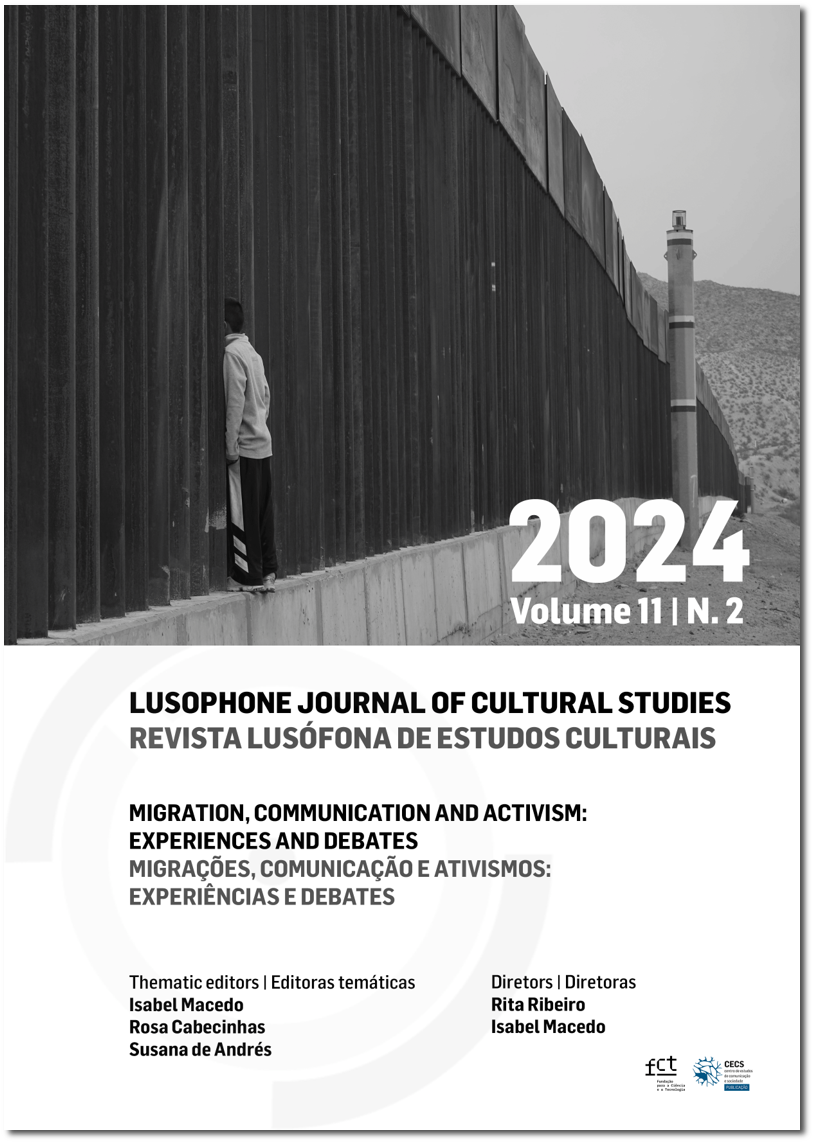Higher Education Admission Process for Immigrant and Refugee Students: A Systematic Review
DOI:
https://doi.org/10.21814/rlec.5711Keywords:
refugee students, immigrant students, university, affirmative action policies, higher educationAbstract
This paper is a literature review and develops a framework for theoretical understanding of transnational migratory phenomena related to the growth of global displacement and opportunities for entry into higher education by systematizing the literature available in 15 articles. We used PRISMA Scopus Review, a tool specialized in this type of scientific production, and Ryyan, the free information processing program, which is widely used in the production of systematic reviews. This is a critical analysis of how the principles of equity operate in institutional admission activities. This paper makes use of the theoretical contributions provided by Scott’s (2004) institutional theory, considering the relationship between academic integration materialized in institutional provisions, with an impact on the lives of students in the context of forced mobilization, by implying social, cultural and political determinations that influence the way discourses are conceptualized and constructed (Scott, 2004). It is argued that these equity constructs have an impact on the materialization of policies related to social justice organized politically by states. The article discusses how standardized institutional policies and practices to evaluate the construction of applications and standards of access and equity end up creating new exclusions for migrants. Institutional arrangements used to meet the educational needs of asylum seekers are critically analysed, highlighting the participation of non-state organizations, in an attempt to generate debate that could lead to more structural changes.
Downloads
References
Agência da ONU para os Refugiados . (2023). Relatório CSVM 20 anos. Retirado a 25 de maio de 2024, em https://www.acnur.org/portugues/wp-content/uploads/2024/03/V2-Relatorio-CSVM2023-Digital.pdf
Abamosa, J. Y. (2020). Social inclusion of refugees into higher education: Policies and practices of universities in Norway. Policy Futures in Education, 18(5), 628–647. https://doi.org/10.1177/1478210319878327
Berg, J. (2022). International or refugee students? Shifting organisational discourses on refugee students at German higher education organisations. International Studies in Sociology of Education, 32(2), 511–530. https://doi.org/10.1080/09620214.2022.2048264
Bilic, S., & Thai, T. (2023). ‘One day I will make it to university’: Students from refugee backgrounds in university pathway programs. International Journal of Learning, Teaching and Educational Research, 22(4), 217–241. https://doi.org/10.26803/ijlter.22.4.13
Finatto, C. P., Aguiar Dutra, A., Gomes da Silva, C., Nunes, N. A., & de Andrade Guerra, J. O. (2022). The role of universities in the inclusion of refugees in higher education and in society from the perspective of the SDGS. International Journal of Sustainability in Higher Education, 24(3), 742–761. https://doi.org/10.1108/IJSHE-07-2021-0275
Gonzales, L., Kanhai, D., & Hall, K. (2018). Reimagining organizational theory for the critical study of higher education. In M. Paulsen (Ed.), Higher education: Handbook of theory and research (pp. 560–590). Springer.
Kalnisky, E. (2013). Increasing access to higher education and employment, Ethiopian immigrants’ in Israel. Intercultural Education, 24(5), 476–488. https://doi.org/10.1080/14675986.2013.844580
Kislev, E. (2016). The effect of education policies on higher-education attainment of immigrants in Western Europe: A cross-classified multilevel analysis. Journal of European Social Policy, 26(2), 183–199. https://doi.org/10.1177/0958928716637142
Lacomba, C. (2021). The educational incorporation of DACA recipients in multilayered immigration policy contexts. Journal of Ethnic and Migration Studies, 48(11), 2678–2697. https://doi.org/10.1080/1369183X.2021.1885357
Murray, R., & Baker, S., (2024): Disrupting binary thinking about sanctuary initiatives in the UK and Australia: insights from a Derridean analysis of hostipitality. Critical Studies in Education, 64(5), 531–549. https://doi.org/10.1080/17508487.2024.2314127
Peres, L. B., da Rosa Cerqueira-Adão, S. A., & Freddo Fleck, C. (2022). Integrating and welcoming: Access for Haitian refugees and immigrants to universities. Educação e Pesquisa, 48, 1-21. https://doi.org/10.1590/S1678-4634202248244344eng
Parlamento Europeu. (2024). Asilo e migração na UE em números. https://www.europarl.europa.eu/topics/pt/article/20170629STO78630/asilo-e-migracao-na-ue-em-numeros#migrao-na-europa-nmeroschave-em-2023-9
Pherali, T., & Abu Moghli, M. (2019). Higher education in the context of mass displacement: Towards sustainable solutions for refugees. Journal of Refugee Studies, 34(2), 2159–2179. https://doi.org/10.1093/jrs/fez093
Piovesan, A., & Temporini, E. R. (1995). Pesquisa exploratória: Procedimento metodológico para o estudo de fatores humanos no campo da saúde pública. Revista de Saúde Pública, 29 (4), 318–325. https://doi.org/10.1590/S0034-89101995000400010
Pinsonneault, A., & Kraemer, K. L. (1993). Survey research methodology in management information systems: An assessment. Journal of Management Information Systems, 10(2), 75–105.
Prodanov, C. C., & De Freitas, E. C. (2009): Metodologia de trabalho científico: Métodos e técnicas da pesquisa e do trabalho acadêmico. Feevale.
Right, R., Duan, W., Dunn, W., & Spinder, K. (2007). How to write a systematic review. Clinical Orthopaedics and Related Research, 455, 23–29. https://doi.org/10.1097/BLO.0b013e31802c9098
Sampieri, R., Collado, C., & Lucio, P. (2006). Metodologia de pesquisa. McGraw- Hill.
Scott, W. R. (1975). Organizational structure. Annual Review of Sociology, 1, 1–20.
Scott, W. R. (2004). Institutional theory: Contributing to a theoretical research program. In K. Smith, & M. Hitt (Eds.), Great minds in management: The process of theory development (pp. 1–48). Oxford University Press.
Tricco, A., Lillie, E., Zarin, W., O’Brien , K., Colquhoun, H., Levac, D., Moher, D., Peters, M. D. J., Horsley, T., Weeks, L., Hempel, S., Aki, E. A., Chang, C., McGowan, J., Stewart, L., Hartling, L., Aldcroft, A., Wilson, M. G., Garritty, C., Lewin, S., …, Strauss, S. E. (2018). PRISMA extension for scoping reviews (PRISMA-ScR): Checklist and explanation. Annals of Internal Medicine, 169(7), 1–20. https://doi.org/10.7326/M18-0850
van Dijk, D. (2021). Working toward aspirations: How higher education learning-working trajectories for refugees in the Netherlands support work-related capabilities. Journal of Applied Research in Higher Education, 14(2), 917–929.
Watkins, P., Razee, H., & Richters, J. (2012). “I’m telling you… the language barrier is the most, the biggest challenge”: Barriers to education among Karen refugee women in Australia. Australian Journal of Education, 56(2), 1–16.
Webb, S., Dunwoodie, K., & Wilkinson, J. (2019). Unsettling equity frames in Australian universities to embrace people seeking asylum. International Journal of Lifelong Education, 38(1), 103–120. https://doi.org/10.1080/02601370.2018.1559891
Downloads
Published
How to Cite
Issue
Section
License
Copyright (c) 2024 Efrén Alvarado Cevallos, Enrickson Varsori , Alexandre Anselmo Guilherme

This work is licensed under a Creative Commons Attribution 4.0 International License.
Authors own the copyright, providing the journal with the right of first publication. The work is licensed under a Creative Commons - Atribuição 4.0 Internacional License.












